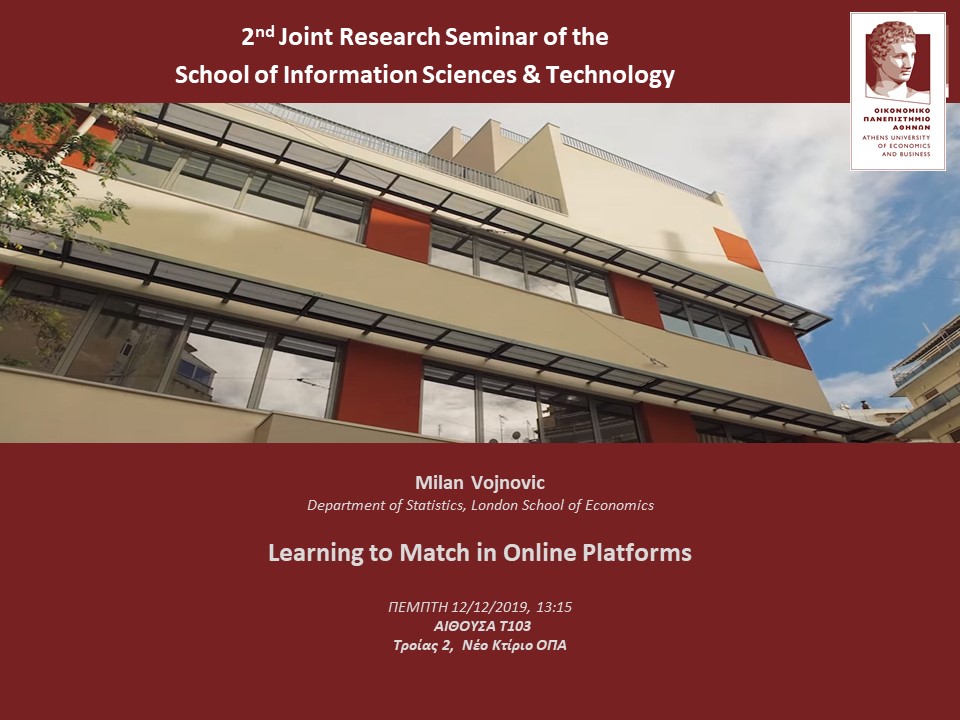 Re: 2nd Research Seminar of the AUEB School of Information Sciences & Technology 12/12/2019:
Re: 2nd Research Seminar of the AUEB School of Information Sciences & Technology 12/12/2019:
Wed 18 Dec 2019 - 8:56
Οι Διαφάνειες του σεμιναρίου είναι διαθέσιμες εδώ
http://personal.lse.ac.uk/vojnovic/Athens-talk.pdf
http://personal.lse.ac.uk/vojnovic/Athens-talk.pdf
 2nd Research Seminar of the AUEB School of Information Sciences & Technology 12/12/2019:
2nd Research Seminar of the AUEB School of Information Sciences & Technology 12/12/2019:
Fri 11 Oct 2019 - 18:05
2ND RESEARCH SEMINAR OF
THE SCHOOL OF INFORMATION SCIENCES & TECHNOLOGY

Milan Vojnovic
Department of Statistics, London School of Economics
Learning to Match in Online Platforms
THURSDAY 12/12/2019, 13:15
Room Τ103,
Troias 2, New AUEB Building
ABSTRACT
A fundamental problem arises in online platforms that requires to match users and tasks so that work is performed efficiently. For example, in collaborative online Q&A platforms, experts need to be matched to questions posed by other users, and in popular freelancing online platforms, independent professionals need to be matched to jobs posted by various businesses. This is a challenging problem because of uncertainty (about user skills and task requirements) and online decision making (users and/or tasks arrive over time and have to be matched upon their arrival).
We will first present our results on the efficiency of strategies for matching users and tasks that not only use the prior information about the task but also the information observed while matching a task to users until its successful completion. We will show how the concepts originally developed in the area of queueing networks, can be combined with learning to devise efficient matching policies. In particular, we will show throughput-optimality of a backpressure policy that accounts for the competition between different task types.
We will then present some of our results on the efficiency of matching policies that use only some summary statistics (we refer to as test scores) to represent skills of individuals, and use these test scores to match individuals to projects. On the positive side, we will show how test scores can be designed to guarantee efficiency of matches for various team production functions. On the negative side, we will show that some simple, intuitive tests scores can fail to provide efficient matches.
Joint work with Lennart Gulikers, Laurent Massoulie, and Virag Shah (first part) and Shreyas Sekar and Seyoung Yun (second part).
Facebook event: https://www.facebook.com/events/378323946384251/
THE SCHOOL OF INFORMATION SCIENCES & TECHNOLOGY

Milan Vojnovic
Department of Statistics, London School of Economics
Learning to Match in Online Platforms
THURSDAY 12/12/2019, 13:15
Room Τ103,
Troias 2, New AUEB Building
ABSTRACT
A fundamental problem arises in online platforms that requires to match users and tasks so that work is performed efficiently. For example, in collaborative online Q&A platforms, experts need to be matched to questions posed by other users, and in popular freelancing online platforms, independent professionals need to be matched to jobs posted by various businesses. This is a challenging problem because of uncertainty (about user skills and task requirements) and online decision making (users and/or tasks arrive over time and have to be matched upon their arrival).
We will first present our results on the efficiency of strategies for matching users and tasks that not only use the prior information about the task but also the information observed while matching a task to users until its successful completion. We will show how the concepts originally developed in the area of queueing networks, can be combined with learning to devise efficient matching policies. In particular, we will show throughput-optimality of a backpressure policy that accounts for the competition between different task types.
We will then present some of our results on the efficiency of matching policies that use only some summary statistics (we refer to as test scores) to represent skills of individuals, and use these test scores to match individuals to projects. On the positive side, we will show how test scores can be designed to guarantee efficiency of matches for various team production functions. On the negative side, we will show that some simple, intuitive tests scores can fail to provide efficient matches.
Joint work with Lennart Gulikers, Laurent Massoulie, and Virag Shah (first part) and Shreyas Sekar and Seyoung Yun (second part).
Facebook event: https://www.facebook.com/events/378323946384251/
- 1st Research Seminar of the AUEB School of Information Sciences & Technology by Ioannis Tsitsiklis
- First One-Day Conference of the School of Information Science of AUEB: Wednesday 17/4/2019
- AUEB INFORMATICS SEMINAR: Causality and Directed Information in Communication, Gambling, Estimation, Inference and Statistical Physics by Haim Permuter
- AUEB CAREΕR MOTIVATION SEMINAR FOR STUDENTS - 12/12/2016: (A) Causal inference in statistics and econometrics & (B) Research Opportunities for Statistics Graduates in the University of Chicago
- AUEB Stats PhD Seminars 2019 Part B: Updated Schedule for September-December 2019
Permissions in this forum:
You cannot reply to topics in this forum

 Grstats
Grstats
